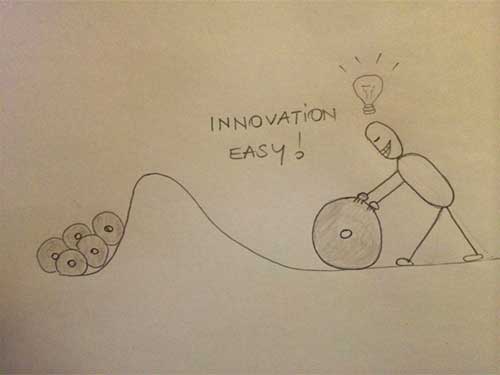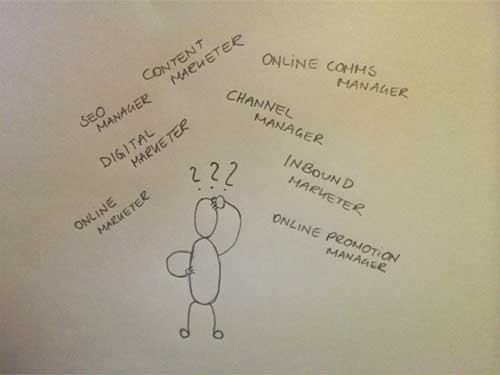The Changing Face of Digital Marketing
So, the face of digital marketing has been changing rapidly over the last few years. It seems every time I read one of the Digital Marketing blogs out there I wonder if I should be changing my job title. New buzzwords are popping up everywhere disguising the fact that people are still doing the same stuff hidden behind a new term nobody properly understands.
This month I want to look at some of those buzz words and see if we can get to the bottom of their actual meaning and purpose. Plus, find out if they are the digital innovation they claim to be or just a re-invention of an old story (one could say re-inventing the wheel wink)...

“Everyone believes in innovation until they see it. Then they think, ‘Oh no; that’ll never work. It’s too different’” (Nolan Bushnell, Entrepreneur and founder of Atari)
What Happened to Digital Marketing?
Before we delve into all these new terms, words and titles, let’s ask ourselves ‘What happened to Digital Marketing?’
With the increase of Google Updates, penalties and general Google grumpiness we have slowly seen a decline in some of the known terms of Digital Marketing. To some degree, when at a client meeting, you got to think twice about what you say or who you are.

Most SEO Experts, Digital Marketers, Content Marketers, Inbound Marketers, Online Marketers, Channel Marketers, whoever they prefer to be when reading this blog post, have been pretty much tortured by Google’s changing mind. Well, I might have to start looking over my shoulder when walking home at night for saying “I think the Google rule changes are a good thing”. Why? Well, if I would be Google (I wish), I would have expected the majority of people marketing on my platform to be decent people, instead of taking advantages of specific parameters i.e. page rank, and try to manipulate these, actually think about the words “digital & marketing” and “market”.
So my point – Google is trying to make us what we are meant to be – “decent marketers”.
Well, with that said… are the changes in terminology actually changing the behavior in Digital Marketing, or is it simply a façade to a ‘make-believe’ tactic?
What is Content Marketing?
Penguin, Panda and Hummingbird have changed the Digital Marketing field dramatically. Poor quality content placed across the web, pushed through link farms and creating an influx of links manipulating keyword rankings – has become something of the past (we would hope).
Everyone is talking content and content marketing. But what is content marketing? The name does give a little hint – it must have something to do with content! Brilliant! To make things easy and straight forward here what Wikipedia says it is:
“Content marketing is any marketing format that involves the creation and sharing of media and publishing content in order to acquire customers. This information can be presented in a variety of formats, including news, video, white papers, ebooks, infographics, case studies, how-to guides, question and answer articles, photos, etc” (Wikipedia)
Interesting sounds a lot like what I have been doing over years in on my campaigns. What I do like is that the definition says “to acquire customers” and not what a lot of people still use these tactics for “to increase ranks” and manipulate Google search results.
Content marketing should only really be used in connection with a detailed Audience Analysis. How will you be able to cater for potential customer needs if you do not know who these customers are and where to find them? If you simply place content across the web without keeping your audience in mind then how are you acquiring customers?
Benjamin Franklin really hit the nail on the head quite a while before Google: “Either write something worth reading or do something worth writing…”
So although a big buzz word – nothing really new – something we here at ThoughtShift (we are a Digital Marketing Agency in Brighton) have always aimed to do – create engaging, relevant, high quality content that will attract key audiences and drive good quality visits (and conversion) for our clients! Our case studies tell the story!
What is Inbound Marketing?
Some of my connections within the industry have changed from Digital Marketers to “Inbound Marketers” or “Inbound Marketing Managers”. This has for a while really intrigued me. When talking to them about this new and interesting sounding job role, it all seemed pretty much the same story with a different headline.
Once I give you the definition of inbound marketing you will be scratching your head:
Inbound marketing is promoting a company through blogs, podcasts, video, eBooks, Enewsletters, whitepapers, SEO, social media marketing, and other forms of content marketing which serve to bring customers in closer to the brand, where they want to be… Inbound marketing earns the attention of customers, makes the company easy to be found and draws customers to the website by producing interesting content. (Wikipedia)
Emmmm? What? But I thought that would be the job of a Content Marketer, which was originally the job of a Digital Marketer? It might just be me but something doesn’t seem right…
Well, the list of buzzwords is long; we could keep going for quite a while. So here my final one, which not only seems to be something that people are talking about but actually something some are making a living off… It will be interesting to see what job-title they will come up with for the following buzz word…
Get a Backlink Cleansing …
Have you had a Backlink Cleansing offer? This has nothing to do with a Facial treatment, or someone really keen on cleaning your old sofa. Although, it does sound like that! Its people claiming that, they can rid you off the links overnight – it only took some 12 months to build those links in the first place – interesting!

I have seen some pretty bad backlink profiles, and I can tell you uploading a file to Google Webmaster Tools will not solve your problems over night. Do you really think Google would let you off the hook that easy (and quick?)? Again a big buzz word at the moment – do not fall for it. Think back to my initial words – I strongly believe Google will recognize that you have changed your behavior – and will be forgiving on your mistakes, if you show that you have actually changed.
This brings up the following question…
What is Really Important?
Yes, what is actually important? Ultimately? Well, getting people (your audience) interested in YOU, get them talking about YOU online (in a good way). You just can’t beat good old word of mouth, be it on- or offline! How do you do that? By going back to marketing basics and understand their needs, then try to fulfil those needs – online (mindboggling I know)! How you DO NOT do it - just because everyone is talking “content” doesn’t mean you should flood the web with meaningless words. Instead, give specific answers to the questions your audience is asking.
This also means that you might not be talking ‘all the time’ about your products or services, but other compelling and interesting stories that will allow you to grab attention and build trust online.
So, I shall leave you with some wise words from my bearded favorite Rand Fishkin, which pretty much confirms what I just said - “Best way to sell something: don’t sell anything. Earn the awareness, respect, and trust of those who might buy”
Follow my contributions to the blog to find out more about Digital Marketing, or sign up to the ThoughtShift Guest List, our monthly email, to keep up-to-date on all our blogposts, guides and events.
